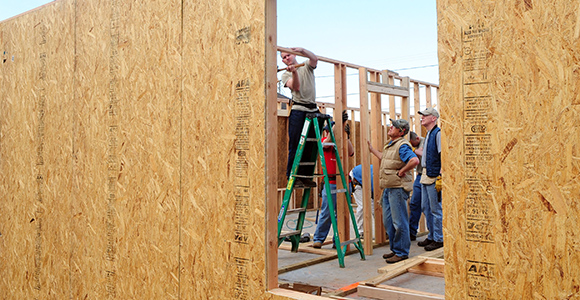
(Photo: Joanna Kresge/USAF)
An important “first step.” That’s how many state leaders characterized last year’s 15-bill package targeting California’s housing crisis, with its first-ever, permanent source of funding for housing, its streamlined regulatory processes for certain types of projects, and its stronger enforcement of state housing goals.
The question now is what that step will actually look like. While the Legislature has moved on to a new set of potential housing policy reforms, the state agency charged with implementing much of the 2017 legislation, the Department of Housing & Community Development, is beginning the less glamorous—but no less important—task of turning last year’s bills into the actual grant programs, regulatory guidelines, technical assistance, and accountability systems that will be needed to achieve the package’s stated goal: producing more housing.
In February, California Forward and the California Economic Summit hosted a series of “listening sessions” to assist the Department with this critical implementation challenge, bringing together a group of housing experts and stakeholders to discuss how to maximize the number—and affordability—of units produced by the package’s funding, streamlining, and enforcement provisions.
Today, CA Fwd and the Summit released a summary of the ideas discussed in these sessions—from how to craft the criteria for new SB 2 planning grants to how the Department should hold communities accountable for approving more housing. The report also includes a set of recommendations from CA Fwd highlighting key opportunities for advancing these concepts.
“As the cost of housing keeps going up, CA Fwd and the Summit have been pushing for more comprehensive solutions to the crisis, and participants at our 2017 Summit in San Diego made supporting implementation of the housing package a top priority—viewing it as one of the best chances the state will have this year to make a dent in housing affordability,” said Jim Mayer, president and CEO of CA Fwd. “We saw why in our February meetings, with some of the most respected housing experts in California providing a wealth of information about how the Department can effectively blend related elements of the package, promote the partnerships needed to make it successful, and lay the foundation for a longer-term effort to increase the supply and affordability of housing.”
In its summary of the sessions, CA Fwd highlights three major ideas for expanding the package’s impact—all of which align closely with the Summit’s One Million Homes Framework, an “all of the above” strategy produced in 2017 outlining the range of policy changes needed to combat the state’s affordability crisis. Experts in February identified the following opportunities for HCD this year:
- Connect new funding and streamlining to promote the local planning, accelerated approvals, housing construction, and affordability California needs.
- Build a more robust statewide data system to improve understanding for stakeholders, the public, and all levels of government about where housing progress is (and isn’t) being made—and to allow the Department to more effectively provide technical asisstance and assess when jurisdictions should be held accountable for complying with housing laws and approving their fair share of housing
- Provide a continuum of education, technical assistance, incentives, and, eventually, enforcement to ensure local governments have the resources they need to take on the housing crisis—and the Department has the capacity to effectively enforce state housing laws.
While the CA Fwd listening sessions are only one small part of HCD’s public outreach this year, the Department clearly valued the unique opportunity to think broadly about the scope of the housing crisis—and the scale of solutions needed to address it. “The CA Economic Summit has been a venue I’ve come back to again and again during my time as director, and the work they’ve done over the last few years was instrumental in putting together last year’s package,” said Ben Metcalf, director of the Department of Housing & Community Development. “Partnering with CA Fwd been a helpful pivot toward implementation because they can bring people of every stripe and affiliation together to focus on earnest, thoughtful policymaking in a cross-sectoral way. These sessions have made us better informed and more likely to be successful.”
As the Department begins its next implementation steps—developing new grant criteria and regulatory guidelines—CA Fwd encouraged HCD to consider several additional ways it could widen its impact, including partnering with regional Councils of Government to expand the reach of its technical assistance efforts and making a forceful, strategic push toward developing the statewide housing database California needs to meet its housing goals. CA Fwd also encouraged the Department to continue exploring ways the state can bring down the cost of development—and provide fiscal incentives to jurisdictions approving housing, especially to pay for related local infrastructure.
“The Summit has spent the last several years leading a conversation about how to make housing in California more affordable—and bringing stakeholders together to identify specific ideas for getting there,” said Cathy Creswell, co-lead of the Summit Housing Action Team and a former acting director of HCD. “Last year’s housing package was significant and showed real progress, but to do more—including passing an affordable housing bond in November—we need to ensure critical bills in the package are implemented in a timely and effective manner. The shared goal for all of us now is to make sure HCD has the resources and the support they need so real progress can be made to increase the supply and affordability of housing throughout California, especially for lower income families and workers.”
Call it a first step. Call it the next step. Implementation may not be glamorous, but it may offer one of the best opportunities this year for impacting California’s housing crisis.
Click here to read the full CA Fwd report on its February listening sessions.

